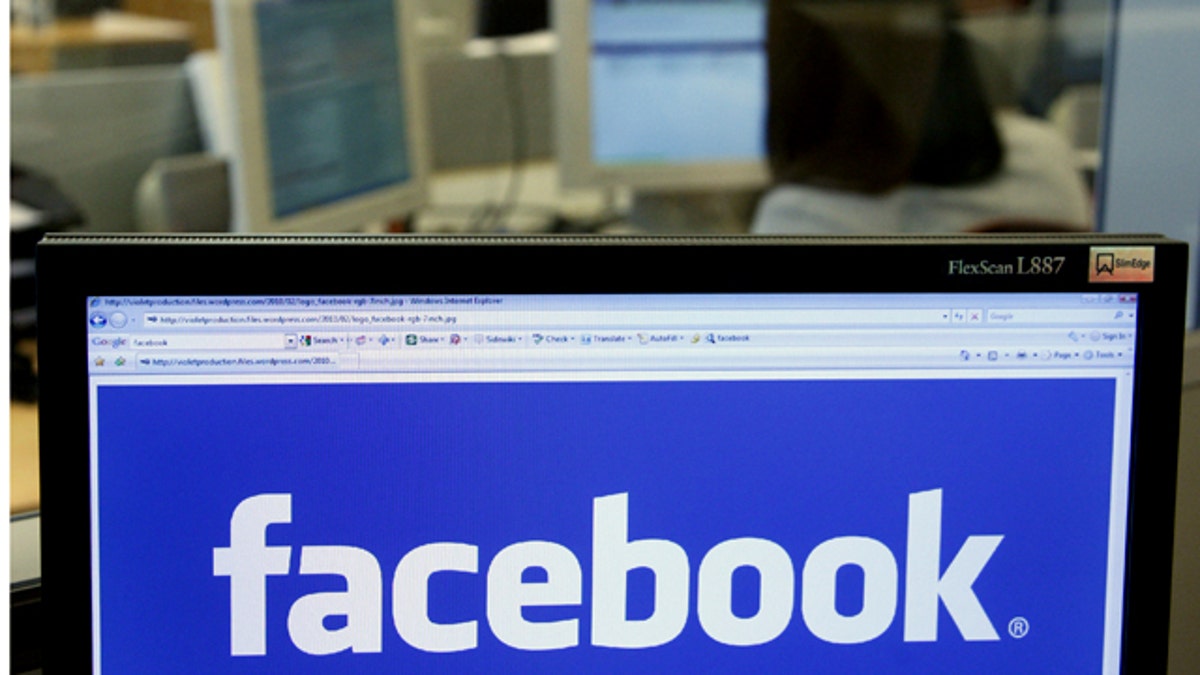
April 21, 2010: The Facebook logo is displayed on a computer screen in Brussels. (REUTERS/Thierry Roge)
It's being called "The Facebook Rule," and it's designed to shut you and me out of at least one social network.
Wildly hyped private firms like Facebook want to raise more private money without going public -- or divulging all their secrets and potentially giving some control to outside shareholders. These days there's a lot of money chasing a few private high-tech companies, but who's in on the deal before they go public a la Groupon?
Many tech companies today are running up against "the 500 rule," a regulation that says a private company like Facebook, Twitter, or Foursquare that has issued private stock to 500 or more investors must either make their financial records public or go public. Companies typically issue stock privately to compensate early investors and employees who later may reap the rewards in an IPO.
But late last month, the House Financial Services Committee approved "The Facebook Rule," which would allow up to 1,000 investors (rather than the current 500) to hold shares in a private company before the business is required to register with the Securities and Exchange Commission and go public.
So what, you ask?
So such a rule change could create an even bigger Internet bubble than the one we experienced a decade ago.
It could make private investments even riskier. Worse, it would perpetuate a largely secret market in stocks that is subject to little regulation and is closed to 99 percent of investors -- like you and me.
Stock in Facebook and many other hot private tech companies is already aggressively traded in something called the secondary market, which pairs those who own private stock with those who would like to have an inside, pre-public piece of a company.
Say you're an early employee or private investor who doesn't want to wait for an IPO (or thinks the IPO might tank). You can sell your stock now through companies such as SecondMarket, SharesPost, or Gate Technologies. Those firms match sellers with buyers in a closed, private -- some would even say clandestine -- exchange. Venture capitalists admit it lacks "transparency."
These exchanges are secretive because no one knows what the companies' financials really look like, so they can't really tell what the shares are worth. Some companies have said they were making money, for example, but when the firms went public it was discovered they were actually losing money.
Worse, the only people allowed to participate besides the inside sellers are so-called accredited investors, which means when it comes to individuals, those who have made $200,000 in each of the past two years and have a reasonable expectation of making $200,000 this year -- or those with at least $1 million in assets (and your house doesn't count, by the way).
So unless you're already a millionaire, you can't get in on these deals. The paternalistic rationale behind this rule is that simple folks like you and me aren't smart enough to invest in such equities without losing our shirts. Only the wealthy are sophisticated enough to take such risks -- and get in on the action early.
Raising the 500 rule to 1,000 would at least double the size of this elite, secondary market (depending on how other related rules are changed). And it's already a big market where the wealthy make big bucks.
Steven Russolillo at the Wall Street Journal has pointed out that private-share transactions totaled $4.6 billion last year, nearly double the total traded the year before, according to research firm Nyppex Holdings. Such private trades could reach nearly $7 billion this year.
Naturally, people making a killing in the secondary markets don't want to let the rest of the riffraff aboard their gravy train. As one private equity expert told me, changing the 500 rule would be a windfall for the secondary market and continue to condone potentially shady practices.
It could also inflate another Internet zeppelin. Wealthy investors and venture capitalists can secretly bid up stock prices ahead of a public offering -- and then leak the information. That's where quotes about Facebook being worth $80 billion (or a gazillion dollars) come from.
Such hype can effectively boost post-IPO prices even further, so that when a company does go public, the poor public pays over-inflated prices. And make no mistake, this is largely a tech phenomena today, with social media and cloud computing companies accounting for the majority of secondary market trades.
Practically speaking, if the 500 rule becomes the 1,000 rule, it would allow Facebook to delay its public offering, and let it keep its business practices and balance sheet largely under wraps. The Facebook rule would also benefit other hyperventilating tech companies, such as Twitter and Foursquare.
Just beware that the new law could also help create the next Pets.com. And we all remember who was left holding the bag then.
Follow John R. Quain on Twitter @jqontech or find more tech coverage at J-Q.com.
